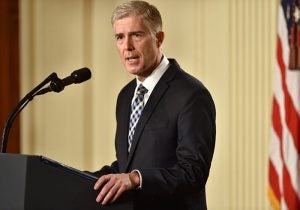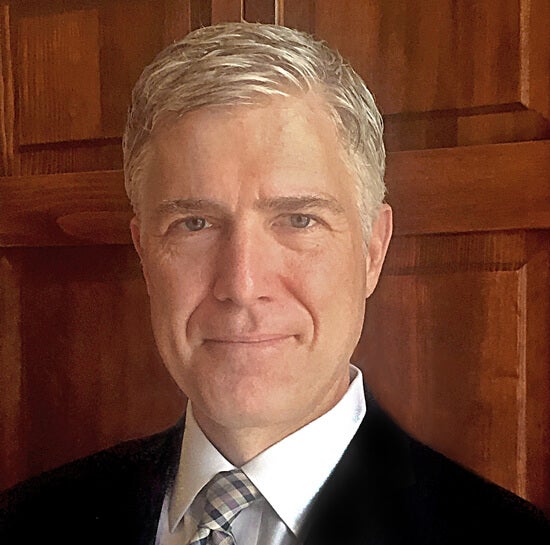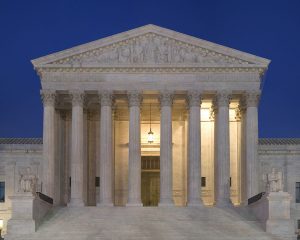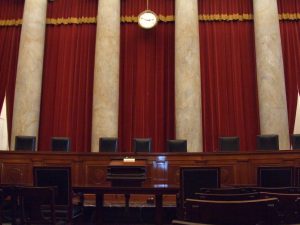
First Year Highlights from Justice GorsuchDuring his first year at the United States Supreme Court, Justice Gorsuch has argued that the First Amendment provides broader protection for religious liberty. In Trinity Lutheran Church v. Comer, where the Court held that a state cannot deny otherwise available public benefits to a church on account of its religious status, Justices Thomas and Gorsuch joined each other’s opinions advocating a more expansive protection of religious freedom. Although the immediate case involved children’s safety – the plaintiff church argued it should receive a grant for rubberizing its playground surface – the two justices believed the Court’s holding should extend beyond cases involving public safety or health. They did not believe it mattered whether a grant recipient put the money received to religious use. Click here for the full list of Justice Gorsuch’s first-year accomplishments. First Liberty Institute Congratulates Justice Gorsuch on His ConfirmationOn April 7, 2017, the Senate confirmed Judge Neil Gorsuch as an associate justice to the U.S. Supreme Court, filling the seat left vacant by former Justice Antonin Scalia. Kelly Shackelford, President and CEO of First Liberty Institute, praises President Trump for his choice of a judicial nominee and congratulates Justice Gorsuch on his confirmation. “President Trump promised to appoint pro-religious freedom judges to the Supreme Court and today, he delivered,” Shackelford says. “Our legal team analyzed many of Judge Gorsuch’s opinions and found him to be a champion of judicial independence, fairness, and strong adherence to the rule of law. That is exactly the kind of justice we should all desire to have on our Supreme Court.” First Liberty Institute recently launched TrumpNominee.com, a website analyzing Judge Gorsuch’s record on constitutional questions and religious freedom. The site shows that Gorsuch authored or signed several landmark religious freedom opinions as a judge on the Tenth Circuit, including cases related to the HHS Contraception Mandate and the Establishment Clause. “America needs Supreme Court justices who will uphold the Constitution and defend our freedoms, especially religious freedom,” Shackelford says. “Justice Gorsuch is just such a man. I congratulate him on his confirmation and look forward to seeing him continue to safeguard our freedoms for years to come.”
Judge Neil McGill Gorsuch was born in Denver, Colorado. He graduated high school from Georgetown Preparatory School, a Jesuit boarding school in the Roman Catholic Archdiocese outside of Washington, D.C. He received his Bachelor of Arts degree from Columbia University where he served as co-founder and first chief editor of a student publication, The Federalist Paper. As a junior, he received the Truman Scholarship award to attend law school. Judge Gorsuch earned his law degree from Harvard Law School and clerked for Judge David Sentelle of the U.S. Court of Appeals for the D.C. Circuit and the Honorable Byron White and the Honorable Anthony Kennedy of the U.S. Supreme Court. Judge Gorsuch received his Doctorate of Legal Philosophy from Oxford University in 2004 where he studied as a Marshall Scholar. Judge Gorsuch worked in private practice in Washington, D.C. before being nominated as Deputy Associate Attorney General at the U.S. Department of Justice. President George W. Bush nominated Gorsuch to the U.S. Court of Appeals for the Tenth Circuit in 2006. He was confirmed by unanimous voice vote in the U.S. Senate on July 20, 2006. His first book, The Future of Assisted Suicide and Euthanasia, was published by Princeton University Press in 2006 and his co-authored book, The Law of Judicial Precedent, was published by Thomson West in 2016. Bipartisan SupportOn July 20, 2006, Judge Neil Gorsuch’s nomination to the U.S. Court of Appeals for the Tenth Circuit was confirmed by unanimous voice vote. The Denver Post reported that individual votes weren’t tallied because “the nomination wasn’t deemed controversial.” |
At a Glance |
| Listen to Kelly Shackelford discuss Judge Gorsuch’s qualifications on the Glenn Beck Show here. |
Summary of Judge Gorsuch’s Key Religious Freedom Cases
Some of the most notable religious freedom opinions Judge Gorsuch wrote or signed as a judge on the Tenth Circuit Court of Appeals include:
- HHS Abortion Pill Mandate – Judge Gorsuch wrote and joined opinions supporting the rights of ministries and closely held family businesses to be free from the burden imposed by the HHS Abortion Pill Mandate (Hobby Lobby Stores, Inc. v. Sebelius (2013), Little Sisters of the Poor Home for the Aged v. Burwell (2015)).
- Establishment Clause – Judge Gorsuch wrote or signed opinions upholding the constitutionality of the public display of Ten Commandments monuments (Summum v. Pleasant Grove City (2007), Green v. Haskell County Bd. of Cnty. Commissioners (2009)).
- Monuments and Memorials – Judge Gorsuch wrote an opinion defending the existence of cross-shaped memorials for fallen state troopers (American Atheists, Inc. v. Davenport (2010)).
Analysis of Judge Gorsuch’s Key Religious Freedom Cases
Establishment Clause
Judge Gorsuch joined an opinion supporting the right of cities to choose which monuments to display. He disagreed with the majority’s decision not to review a case that required the government to display the Seven Aphorisms of Summum if it displayed a Ten Commandments monument. The dissent joined by Gorsuch argued that the government must be free to “make reasonable, content-based judgments regarding whether to allow the erection of privately-donated monuments in their parks.”
Judge Gorsuch wrote a dissent in support of a cross memorial dedicated to fallen state troopers. He disagreed with the majority’s decision not to review a case that misapplied the “reasonable observer” test. His opinion explains the problems that such misapplications cause in Establishment Clause cases. Gorsuch’s dissent also argues that erecting cross memorials does not “establish a religion or coerce anyone to participate in any religious exercise.”
Judge Gorsuch wrote an opinion in support of a Ten Commandments display. He disagreed with the majority’s decision not to review the case, arguing that the decision below misapplied Supreme Court precedent to strike down the display.
Religious Tolerance
In a concurring opinion supporting Hobby Lobby, Judge Gorsuch wrote that the Green family should not lose their individual religious rights merely because they run a company. The opinion also stated that the Religious Freedom Restoration Act protects even “unpopular religious beliefs,” and vindicates “this nation’s long-held aspiration to serve as a refuge of religious tolerance.”
Judge Gorsuch joined an opinion in support of the First Amendment rights of the Little Sisters of the Poor, a group of Roman Catholic nuns dedicated to serving the elderly. He disagreed with the majority’s decision not to review their case. He would hold that whenever the government imposes a significant penalty for refusing to do something prohibited by a person’s sincere religious beliefs, the government is substantially burdening that person’s religious beliefs.
Learn more about Gorsuch’s record and read responses to his nomination
- SCOTUS Blog, Potential nominee profile: Neil Gorsuch (1/13/17)
A review of Gorsuch’s legal record on Religion, Criminal Law, Death Penalty, Dormant Commerce Clause, and Administrative Law.
- SCOTUS Blog, Special Feature: A Close look at Neil Gorsuch’s jurisprudence (Ongoing)
A series on Gorsuch’s jurisprudence and views on various legal topics –including civil rights, abortion, religion, class actions, First Amendment jurisprudence – and how these might compare with Justice Scalia’s.
- Biography.com, Neil Gorsuch Biography
A detailed overview of Gorsuch’s personal life and legal career.
- American Bar Association, ABA Committee on Federal Judiciary Rates Supreme Court Nominee Neil Gorsuch “Well Qualified” (3/9/17)
The American Bar Association’s Standing Committee on the Federal Judiciary rated Gorsuch “Well Qualified,” which is the highest rating they give.
- The White House, Bipartisan Praise For The “Impossible To Oppose” Judge Neil Gorsuch (1/31/17)
Statements of praise for Gorsuch from a wide variety of judges, editorial boards, political leaders, and interest groups.
- The Heritage Foundation, A Closer Look at Neil Gorsuch, an Excellent Choice for the Supreme Court (2/1/17)
“Gorsuch is an eminently qualified and well-respected judge with a record that demonstrates he cares about religious liberty, the separation of powers, and the original public meaning of the Constitution and the laws he interprets. He would be a fine successor to Scalia.”
- National Rifle Association, Trump Supreme Court Nominee Neil M. Gorsuch Would Respect the Second Amendment (2/3/17)
“Judge Gorsuch’s embrace of originalism is a bulwark for our Second Amendment rights.”
- National Right to Life, National Right to Life Praises Nomination of Judge Gorsuch to Supreme Court (1/31/17)
“We are heartened that Judge Gorsuch appears to share Justice Scalia’s view that federal judges are constrained to enforce the text and original intent of constitutional provisions…”
- National Review, Neil Gorsuch: A Worthy Heir to Scalia (1/31/17)
“[Gorsuch is] a textualist and an originalist…in the vein of Antonin Scalia.”

 Biography of Judge Neil Gorsuch
Biography of Judge Neil Gorsuch










